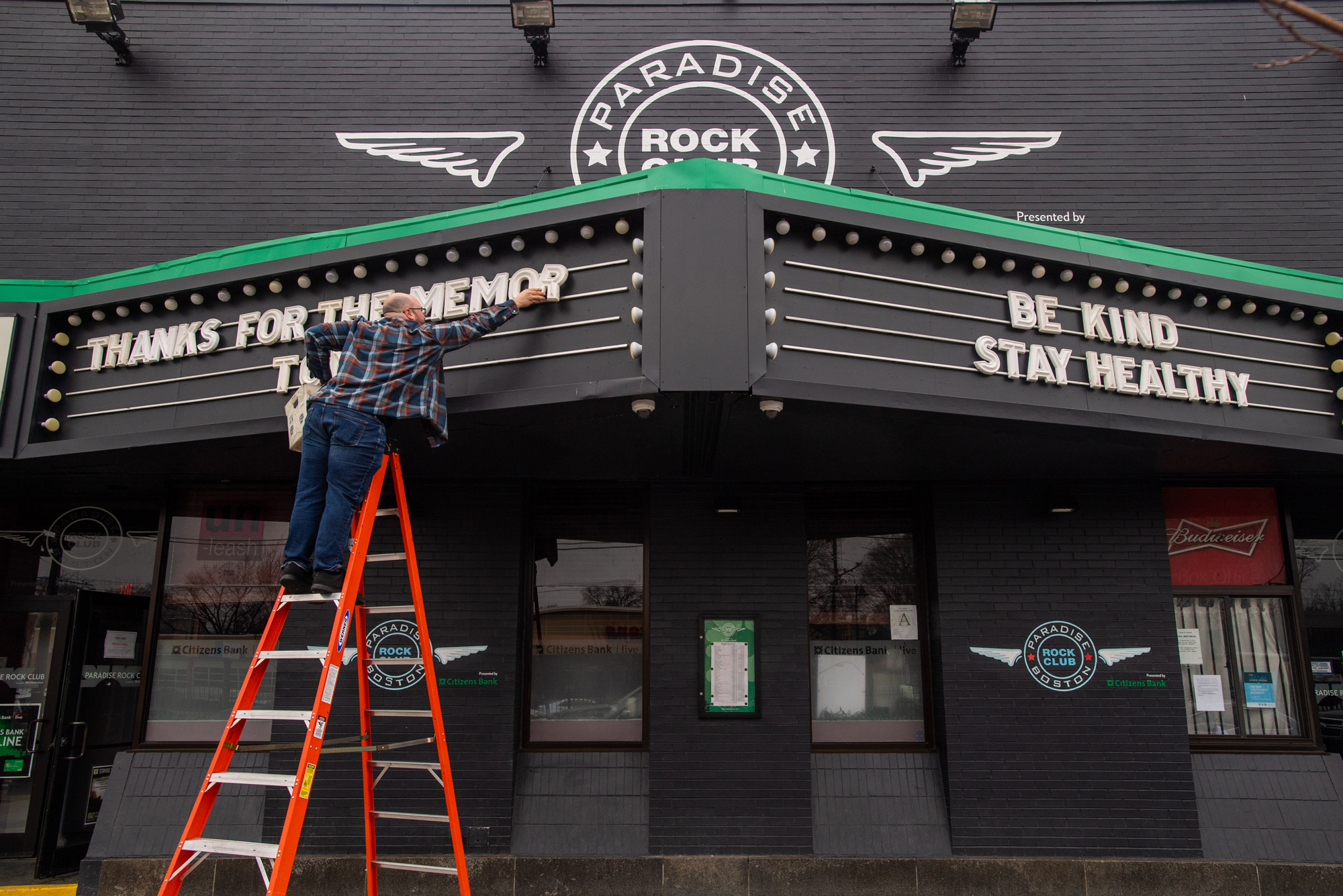BU Expert Urges Putting the Brakes on Massachusetts Relaxed COVID-19 Rules

Public health experts worry that Massachusetts is moving too fast in loosening COVID-19 restrictions on performance venues, like the Paradise Rock Club near campus. Photo by Cydney Scott
BU Expert Urges Putting the Brakes on Massachusetts Relaxed COVID-19 Rules
Infectious disease modeler Brooke Nichols says business concerns may be trumping safety
Did Massachusetts Governor Charlie Baker—a Republican who’s been more Anthony Fauci than Donald Trump in his approach to the COVID-19 pandemic—jump the gun by relaxing restrictions on indoor gatherings earlier this week?
Afraid so, says Brooke Nichols, a School of Public Health assistant professor of global health. She’s especially concerned about the reopening of performance sites—at no more than half-capacity and with a 250-person cap—in communities that the state has designated as low in coronavirus cases.
The state also raised the number of people permitted at outdoor venues to the same 50 percent/250 people maximum, and is allowing 50 percent capacity at public trampolines, obstacle courses, roller rinks, and laser tag centers. Earlier, officials had upped from 6 to 10 the size of parties permitted indoors at restaurants.
The moves came as positive COVID tests have inched up of late. Massachusetts averaged 625 cases a day in the week that ended Wednesday, a 56 percent increase from two weeks prior.
While certain Massachusetts communities are doing better than others, the daily statewide average for COVID-19 cases has had a worrisome uptick in recent days. Courtesy of City of Boston
“By now, the governor should know that when it comes to COVID-19 amid a failed federal response, the Commonwealth can’t have it both ways,” the Boston Globe writes in an October 2 editorial. “Letting indoor businesses gather more people—known to increase risk of community spread—undermines schools’ ability to safely return to in-person instruction, because schools are not isolated bubbles.” Among the worried experts the paper cites as saying whoa was Nichols, a health economist and infectious disease mathematical modeler, who shared her thoughts with BU Today.
Q&A
With Brooke Nichols
BU Today: Is your concern about indoor performance venues only? Or does the state’s expanded capacity limits for other businesses—gyms, libraries, museums—raise health concerns as well?
Brooke Nichols: Those all raise concerns for increased transmission. Currently, we’re seeing a steady increase in cases in Massachusetts. Now is not the time to start relaxing restrictions on any venues where people gather indoors. Particularly if we want to be able to open K-12 (or even K-5) schools again, we need to do everything we can to keep incidence low.
BU Today: Given that Governor Baker has generally been cautious about COVID risks, at least compared to his red state counterparts, why do you think he’s going ahead with relaxing restrictions?
Brooke Nichols: Pure speculation, but I imagine it has to do with the economy, and also an idea that areas with low incidence can and should have different rules than those with high incidence. In theory, I understand it; it makes sense to ease restrictions in parts of the state where incidence is currently low. Unfortunately, people are very mobile between towns, and infectious diseases don’t respect borders.
BU Today: Is this a problem that the market will solve? That is, might many people be so spooked by COVID-19 that they’ll continue shunning performances and other indoor public spots?
Brooke Nichols: I wish. However, I don’t think we’ve seen enough evidence that the market will solve this problem on its own given the outbreaks we’ve seen—and continue to see—across our country.
Before we see any expanded indoor capacity limits anywhere in the state, I’d like to first see children back at school.
Comments & Discussion
Boston University moderates comments to facilitate an informed, substantive, civil conversation. Abusive, profane, self-promotional, misleading, incoherent or off-topic comments will be rejected. Moderators are staffed during regular business hours (EST) and can only accept comments written in English. Statistics or facts must include a citation or a link to the citation.